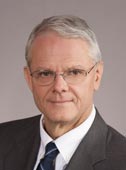CHAIR'S COLUMN
Academic Position
Descriptions: What’s in
a Name?

James Rutka
|
For years, the Department of
Surgery has designated academic
position descriptions for its full
time faculty in three separate
categories: 1) Surgeon-Scientist;
2) Surgeon-Investigator; and 3)
Surgeon - Teacher. While these
three designations encompass and
represent the roles surgeons play
in the Department of Surgery,
and on which they are evaluated
annually, with the evolution of a number of new interests
amongst faculty members, these three designations now
seem insufficient. For example, it became quite obvious to
me that we had many surgeons who were actively engaged
in global health and global surgery. In fact, some of our
faculty continue to spend substantial times away from
Toronto helping develop infrastructure and capacity for
communities of surgeons in developing countries.
Accordingly, with the assistance of Avery Nathens,
Vice Chair of Integration, the Surgeon-Global Health
(SGH) position description was developed and approved.
For this particular position description, the meritorious
activities for a surgeon in global health were articulated.
Surgeons with SGH designation may be involved in
low to middle income countries (LMICs) by creating
and enhancing research and clinical endeavors in these
locations, training learners, creating partnerships, and
creating educational infrastructure among other things.
Surgeons in the SGH category would be evaluated
for their impact in the field by virtue of their leadership
positions locally or nationally, their mentorship of
surgeons in LMIC’s, their capacity building, and their
publication of scholarly works in peer reviewed journals.
I am pleased to provide some references below of papers
published by our faculty and residents in this regard. At
the moment, several faculty members have now chosen
the SGH career pathway as their primary academic job
description.
More recently, the Department of Surgery has approved
the Surgeon-Ethicist (SE) position description. This arose
in part from the interests of Martin McKneally, Editor of
the Spotlight, and colleagues who have devoted themselves
to this particular topic area. In this position description,
the SE is focused primarily on ethics with the objective of
improving patient care and giving learners and colleagues
skills for ethical reasoning. Scholarly work in this category
is related to ethics in surgery. The surgeons in this category
will be teaching ethics to learners across the spectrum of
training. In this role, there is great opportunity to collaborate
with the Joint Centre for Bioethics at the University
of Toronto, to participate as a consultant to research ethics
boards. In addition, such SE designees will be leading
major ethics initiatives in the Department through visits
and lectures. Evidence of impact for this category would
include publications of scholarly works in peer reviewed
journals in ethics, awards recognizing contributions made
to surgical ethics, and peer reviewed funding to support
ethical ethics research in the Department of Surgery.
|
I am delighted now that we have been able to create
these two new position descriptions, which will be of
great benefit to faculty members whose contributions in
the Department would otherwise not be recognized in
such clear terms. I am grateful to Avery Nathens for the
SGH position description, and to Martin McKneally, for
the SE position description which will be used now and
in the future for years to come for faculty going forward
for promotion.
James T Rutka,
RS McLaughlin Professor and Chair,
Department of Surgery
GLOBAL HEALTH AND SURGERY REFERENCES
Cadotte DW, Blankstein M, Bekele A, Dessalegn S, Pain C,
Derbew M, Bernstein M, Howard A. Establishing a surgical
partnership between Addis Ababa, Ethiopia, and Toronto,
Canada. Can J Surg. 2013 Jun;56(3):E19-23. doi.10.1503/
cjs.027011.
Chandauka T, Leusink A, Hsiao M, Kahn D, Azzie. The
International Association of Student Surgical Societies: creation
and dissemination. Can J Surg. 2016 Oct 1;59(6):816.
doi: 10.1503/cjs.000816 (Epub head of print)
Cintolo-Gonzalez JA, Bedada AG, Morris J. Azzie G. An
International Rotation as a Systems-Based Elective: The
Botswana-University of Pennsylvania Surgical Experience.
J Surg Educ. 2016 Mar-Apr;73(2):355-9. doi:10.1016/j.
jsurg.2015.09.019. Epub 2015 Nov.17. Review.
Ibrahim GM, Cadotte DW, Bernstein M. A framework for the
monitoring and evaluation of international surgical initiatives
in low-and middle-income countries. PLoS One. 2015 Mar
30;10(3):e0120368. doi:10.1371/journal.pone.0120368.
eCollection 2015
Ng-Kamstra JS, Riesel JN, Arya S, Weston B. Kreutzer
T, Meara JG, Shrime MG. Surgical Non-governmental
Organizations: Global Surgery’s Unknown Nonprofit Sector.
World J Surg. 2016 Aug;40(8):1823-41. doi. 10.1007/
s00268-016-3486-1.
SURGEON-ETHICIST REFERENCES
Camp MW, Gross AE, McKneally MF. Patient Views on
Financial Relationships between Surgeons and Surgical Device
Manufacturers. Can J Surg. 2015; 58:323–9
Ibrahim GM, Bernstein M. Models of Neurosurgery International
Aid and Their Potential Ethical Pitfalls. Virtual Mentor
2015. 17 (1), 49-55.
Lipsman N, Giacobbe P, Bernstein M, Lozano AM. Informed
Consent for Clinical Trials of Deep Brain Stimulation in
Psychiatric Disease: Challenges and Implications for Trial
Design. JMed Ethics. 2012 Feb;38(2):107-11.
Snelgrove R, Ng S, Devon K. Toward a Recognition of Ethics in
Everyday Practice. Journal of Graduate Medical Education:
July 2016, Vol. 8, No. 3, pp. 462-464.
Suri M, McKneally M, Devon K. Tragic Knowledge: Truth
Telling and The Maintenance Of Hope In Surgery. World J
Surg. 2014 Jul;38(7):1626-30
|